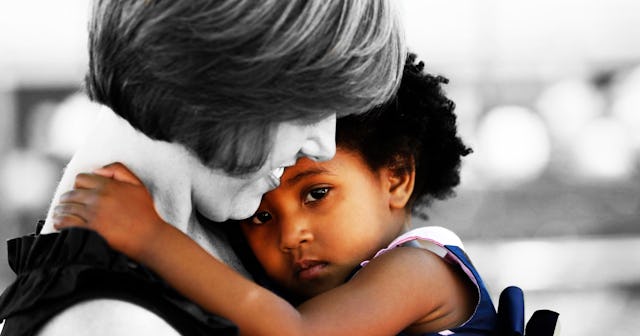Transracial Adoption Frequently Ruins Lives—I Say This As A White Adoptive Mom

The text on the lime green graphic was straightforward and sobering: “Adoption ruins lives.”
In November, which is National Adoption Month, many of us come to expect the heartwarming stories of forever families and the unending stream of statistics about the number of children awaiting adoption within the U.S. foster care system.
As a white adoptive mom with six kids, these are the stories and statistics that I’m used to. The stories and statistics that have become comfortable.
So when I saw the graphic on a message board I follow with the words “adoption ruins lives” – posted in an effort to turn the popular #adoptionsaveslives narrative on its head – I felt instantly uncomfortable. But if ever there was a time to embrace being uncomfortable and acknowledge that uncomfortability is often the precursor to change, it’s 2020. So rather than ignoring those words, I decided to tap into my own culpability and take a hard look at the way that I had furthered this narrative within my own sphere.
It’s fair to say my husband and I were naive when we signed up to become foster parents seven years ago. I grew up with a foster home in my neighborhood and was fortunate to spend several summers playing with and befriending the kids who lived there. As a teen, becoming a foster and adoptive parent simply become a life goal, right up there with buying a two-story house and retiring in Hawaii.
After we accepted our first foster placement of an African-American baby girl, I reveled in comments from friends and neighbors calling us saints and superheroes and quickly dismissed criticism from her biological family during visits about the way I did her hair.
“Shouldn’t they,” I huffed to my husband one day, “have bigger things to worry about?!”
Over the years, as I became more educated about the history of systemic racism in the U.S. foster care system and the potential devastation of transracial adoption for adoptees and their biological families, I felt paralyzed. I needed to do more, both for myself and for my transracial adoptee children. But how?
After George Floyd’s death, while I helplessly posted a black square and hashtagged #blacklivesmatter on Instagram, three of my daughters organized a cookie and craft sale that raised more than $400 in three hours for a nonprofit called Measure that uses data to empower communities and eliminate social disparities. If they could make that kind of an impact in an afternoon, surely I could do something, too.
PixelsEffect/Getty
I started following transracial adoptees like @angieadoptee, @_heytra, @iamadopted, @the_daily.adoptee and @theljsharks, where I learned about things like white savior complex (which I had), the pain caused by the #adoptionrocks hashtag (which I used), and the insensitivity of celebrating the anniversary of the day a child arrived at an adoptive home as the child’s “Gotcha Day” (which I had done).
I learned about the alienation transracial adoptees can feel growing up in predominantly white suburbs (as my children are) and instantly flashed back to my daughter on her birthday two years ago, desperately trying to blow out her candles while a white classmate who was fascinated by her curls intensely toggled her bun like a joystick. I had corrected the girl and restarted “Happy Birthday,” but why hadn’t I admonished her and her mom, too?
I researched suspension rates and found that in Austin, where we live, schools suspend Black students nearly five times as often as white students and that as early as age five, black girls are viewed by adults as more knowledgeable about sex and adult topics, less in need of nurture and support, and significantly older than white girls of the same age. Suddenly the fact that one of my children had been sent to the principal’s office as a second-grader didn’t sit well with me.
I also pored over numbers about the impact of adoption on a child’s mental health and the failures of Medicaid – the insurance that most foster and adoptive children have, including mine – to adequately provide for their needs. I thought about the waitlists for specialists and psychiatrists that we’ve been on for over a year and knew that was true.
Black and brown children remain far overrepresented in foster care, and the system is structured so that it’s nearly impossible for biological families to break the cycle. I looked at the way I had intentionally and unintentionally vilified my children’s birth families and went back to make amends and build new bonds, for my kids’ sake and for my own.
I’ve come a long way, but I know it will be a lifelong education with ups and downs. What I know for sure, though, is that it’s time for us white adoptive parents to stop hiding behind prayers and God’s will and cute hashtags and use our white privilege to help dismantle racist systems that rip so many people’s lives to shreds. It’s time to volunteer, donate, organize, educate, amplify Black voices, offer our children Black mirrors and act as actual allies to effect change. It’s time to seek change like our children’s lives depend on it. Because they do.
Adoption, especially transracial adoption, does frequently ruin lives. And it’s on us to fight to fix it.
This article was originally published on